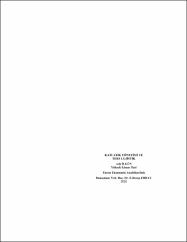| dc.contributor.author | İlgün, Aslı | |
| dc.date.accessioned | 2017-05-05T06:51:22Z | |
| dc.date.available | 2017-05-05T06:51:22Z | |
| dc.date.issued | 2010 | |
| dc.identifier.uri | https://hdl.handle.net/20.500.11776/732 | |
| dc.description.abstract | Katı atık yönetimi; atık yönetimi sistemi içinde oluşan atıkların bertaraf edilmesinde çevreye ve ekonomiye olan etkilerinin en aza indirilmesini amaçlar. Bu amaca ulaşmanın en kısa yolu ise doğal olarak atık miktarının azaltılmasıdır. Atık yönetimi sistemi atıkların nihai bertarafının çevreye bıraktığı zararı en aza indirgemek için en son teknik ve bilgiler kullanır. Ancak bu çalışmanın çerçevesi ekonomik gerçekler içinde çizilmelidir. O halde bu amacı sağlayacak etkenler yöntemin çevresel ve ekonomik yüklerinin değerlendirilmesinden geçer. Bu nedenle atık yönetiminin verimlilik analizi çevresel ve ekonomik etkinlik olmak üzere iki önemli değişken üzerinden yapılmalıdır. Türkiye'de atık yönetimi konusu özellikle son beş yıl içinde artan nüfus ve göç ile birlikte çoğu kez şehir sınırlarının içine kadar giren çöp dökme alanlarının yarattığı sorunlar ile birlikte gündeme gelmiştir. Öncelikle düzensiz depolama sahalarının rehabilitasyonu ve yeni düzenli çöp depolama sahalarının açılması, daha sonra da kompostlama ve geri kazanım konuları gündeme gelmeye başlamıştır. Katı atık yönetimi sayesinde çevre sorunlarının büyük bir kısmı çözümlenmiş olacak, aynı zamanda modern depolama tesislerinin kurulması ile atıkların farklı materyallere dönüşümleri sağlanarak ekonomiye hayat verilmesi söz konusu olacaktır. Bu sayede bu gibi işletmelerin piyasaya girmeleri teşvik edilecek ekonomide yeni bir istihdam kapısı açılacaktır. Ürünlerin geri kazanımı; çevresel kaygılar, firmaların sorumlulukluklarının artması, sürdürülebilir gelişme, daha az malzeme ve kaynak tüketimi açılarından oldukça yaygın hale gelmektedir ve gelecekte de öneminin artması beklenmektedir. Ürünlerin geri almanın ve ürün geri kazanımının sistematik bir şekli olan ve ?tüketim noktasından orijin noktasına doğru olan tüm ürün ve bilgi akışlarının yönetimi süreci? olarak tanımlanabilecek tersine lojistik de, tedarik zinciri süreçlerinden biri olarak literatürde yerini almıştır. Bu çalışma ile katı atık ve ters lojistik faaliyetlerinin tarihi gelişimi, işlenme - dönüşüm aşamaları, ekonomiye olan katkıları ve İstanbul Büyükşehir Belediyesinin bu alanda yaptığı çalışmalar değerlendirilecektir. Bununla beraber katı atık yönetimi ve ters lojistik faaliyetlerinin önemi araştırılarak bugün geldiğimiz nokta sorgulanacak ve bu kapsamda katı atık toplama, dönüşüm ve ters lojistik faaliyetlerinin önemine dikkat çekilmesi hususu sağlanacaktır. Bu Yüksek Lisans Tezi ile Türkiye'de atık yönetimi gelişiminin izlenmesi planlanmaktadır. Ayrıca çalışmanın muhtelif kısımlarında ülke olarak bu konuda hangi aşamada olduğumuz irdelenerek yıllara bağlı olarak katı atık miktarlarındaki değişimler ve farklılıkların ortaya konulması amaçlanmaktadır. | en_US |
| dc.description.abstract | Solid waste management intends to minimize the negative effects of disposed waste materials to environment and economy. The shortest path to achieve this purpose is to reduce the amount of the waste materials. Waste management system uses the latest techniques and information to minimize the negative effects of the final disposed product to the environment. However, this design must be considered in the economic realities. So this goal can only be achieved by the evaluation of the design in terms of environmental and economic factors. Therefore, environmental and economic effects are two important variables in consideration of the waste management efficiency analysis. In Turkey, the increasing population, migration, and dumping areas that falling too into the cities caused serious problems that increased the importance of waste management in last five years. First of all the rehabilitation of the irregular storage areas, the building the new regular storage areas and afterwards composting and recycling issues come into question. Through solid waste management system a large part of environmental problems have been solved, but also establishment of the modern storage facilities will provide conversion of waste materials to usable materials to liven the economy. In this way, new employment markets will be provided by waste management system. Nowadays the product recovery has arisen as an important issue in business environment and is expected to be more important in the near future because of environmental consciousness, firms? social responsibilities, sustainable development and minimization of materials and resources use. Reverse logistics can be considered as a systematic form of product returns and recovery and is defined as the process of managing all of the flow of returned products and information from the point of consumption to the origin. It can be regarded as one of the processes of supply chain. In this way, the study examines the systems and the concepts of reverse logistics. In this study solid waste management and reverse logistics activities? historical development, process and transformation stages, contribution to the economy and the studies that applied in this field by the Istanbul Metropolitan Municipality will be taken into consideration. Furthermore, the importance of the solid waste management and reverse logistics activities and the point to be queried today will be questioned. In this context the importance of the solid waste collection, conversion, and reverse logistics activities will be evaluated. With this research waste management development in Turkey as well as the world to be monitored. And it is highly intended that the investigation of the current position of Turkey in these fields are the main purposes of this research. | en_US |
| dc.language.iso | tur | en_US |
| dc.publisher | Namık Kemal Üniversitesi | en_US |
| dc.rights | info:eu-repo/semantics/openAccess | en_US |
| dc.subject | Katı Atık Yönetimi | en_US |
| dc.subject | Ekonomi | en_US |
| dc.subject | Ters Lojistik | en_US |
| dc.subject | Solid Waste Management | en_US |
| dc.subject | Economy | en_US |
| dc.subject | Reverse Logistics | en_US |
| dc.title | Katı atık yönetimi ve ters lojistik | en_US |
| dc.title.alternative | Solid waste managament and reverse logistic | en_US |
| dc.type | masterThesis | en_US |
| dc.department | Enstitüler, Fen Bilimleri Enstitüsü, Tarım Ekonomisi Ana Bilim Dalı | en_US |
| dc.relation.publicationcategory | Tez | en_US |



















